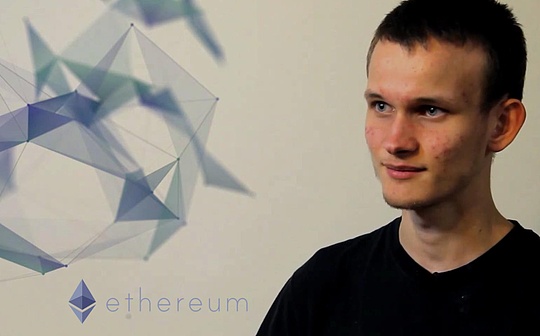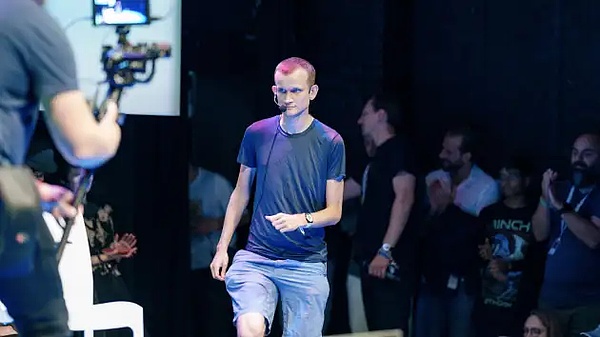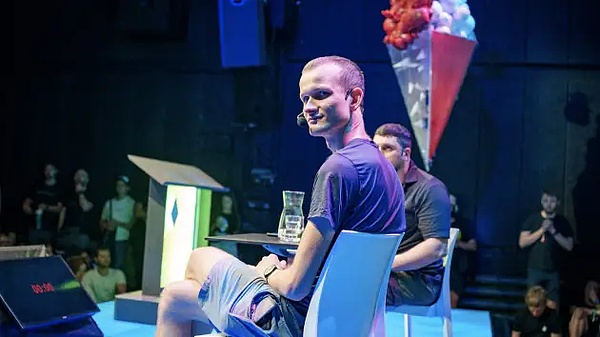
Translator’s Preface
This article is based on a September 2023 interview with Ethereum founder Vitalik Buterin.The article describes Vitalik’s situation in the face of global cryptocurrency suppression policies and his confidence in Ethereum and his passion for crypto technology.In the interview, he talked about how he and the Ethereum Foundation responded to the growing cryptocurrency suppression in the United States and expressed concern about the development of cryptocurrencies in developing countries.He hopes that technology can be truly used by humans and plays an active role.In him, we see that the crypto world is more than just hype and speculation, we can really use encryption to do something meaningful for human development.
Overview of this article
This article is Vitalik Buterin, the man behind ethereum, talks crypto and the U.S. crackdown (Vitalik Buterin, the man behind ethereum, talks crypto and the U.S. crackdown), by MacKenzie Sigalos.The full text is about 4500 words in total, and it is expected to take 25 minutes to finish reading this article.
Content of the text
“Vitalik Buterin, the man behind Ethereum, talks about cryptocurrency and the US’s blow”
Compiled by: Elsa
(Click “Read original text” to jump to the original English link)
Key points:
1. Vitalik Buterin, co-founder of the second most popular cryptocurrency, held talks with CNBC’s MacKenzie Sigalos in Prague, one of the new cryptocurrencies in Europe.
2. He discussed the growing cryptocurrency suppression in the United States and recommended that developing countries continue to carry out the cryptocurrency revolution.
3. He also talked about the huge role he played in the cryptocurrency he created, but believed that his work (Ethereum) already had its own life and was therefore more resistant to government suppression.

Ethereum co-founder Vitalik Buterin is in Prague, where he joins like-minded programmers in search of changing the world with encryption.
CNBC
Prague – For Vitalik Buterin, the concept of home is fleeting.
The Russian-born programmer founded Ethereum at the age of eighteen or nineteen.Now he will not stay in any city for too long.At the same time, there are more and more places he will not go to.
“I was very happy to visit some countries three years ago, and now I am very worried about going to these countries,” Buterin said in an interview with CNBC in the Czech Republic.
Buterin specifically notes that his home country, Russia, is one of the destinations he is now avoiding.The Canadian immigrant has Ukrainian and Russian descent, but he actively supports Ukrainian resistance.It is also obvious that in some global jurisdictions, the pursuit of privacy technology and open source code poses risks, which creates new hesitation for Buterin – for example, the creators of the open source protocol Tornado Cash face charges in both the Netherlands and the United States.In the cryptocurrency market, which is still in its infancy, some people use Tornado Cash to protect their privacy, but currency mixing services may also be used by criminals or nation-states to launder money.Many industry insiders worry that this crackdown is not only a crackdown on criminals using the tool, but also a dangerous precedent for developers building the tool.
“I’m sure I’m more worried about this even in countries where mainstream media thinks it’s still quite normal,” Buterin said.
This decentralized lifestyle is perfect for Buterin.The 29-year-old programmer has a presence in the field of encryption that goes beyond the number of lines of code or geographical location.Prague is a new center of gravity, where he now finds shelter, where he seeks to change the world with like-minded programmers.

Ethereum co-founder Vitalik Buterin spoke at ETHPrague 2023, an international conference that attracted crypto developers from around the world.
Photo: Pavel Sinagl
On the top floor of the huge industrial park in the Holešovice area, we met in a room with simple furniture.Once associated with industrial facilities such as slaughterhouses and steam mills, the area is now home to Bohemian artists and some of the most rebellious cryptocurrency believers.The inside of this seemingly ordinary building is a honeycomb-like maze with winding stairs and maze-like corridors leading to its fortress-like interior, and for those unfamiliar with cryptocurrencies, these complex structures map cryptocurrenciescomplexity.
Today, the biggest challenge facing Buterin and the Ethereum community is ensuring that cryptocurrencies provide real value to people.
“The way I look at the Ethereum ecosystem is that the past decade has been a decade of trying and perfecting Ethereum. Now ten years have been a decade of what we have to really build something people use,” Buterin clasped his hands, from ergonomicHe leaned forward on the kneeling chair and said.
He is arguably the most influential crypto developer today, but when he wrote the Ethereum white paper in 2013, Buterin did not try to be the spotlight.Still, after years of shying away from public acclaim and rejecting invitations from countless media outlets, he still couldn’t get rid of his reputation—or the praising words used to describe him.
As the crypto market peaked in 2021, the 27-year-old Buterin was named the youngest crypto billionaire in the world.In China, people call him “V God”, Time magazine called him a crypto royal family in its April 2022 cover story, and almost anywhere on Earth, there are a large number of fans eager to get hisFollow – and take selfies with him.
But in fact, Buterin is not such a person.
He is not the prince of the crypto world.He is not the fanatical leader of the new generation of crypto-punk.He is not the ruthless workaholic, nor the biggest nerd.He often donates his wealth to valuable causes, thus reducing his net worth.Moreover, according to his own estimates, he is not the ultimate authority of the Ethereum network.
Yet he is a man who cares a lot about realizing his vision: the world, whoever they live, receives money equally.

ETHPrague 2023 was held in Paralní Polis, Czech Republic.
Photo: Pavel Sinagl
Buterin found that cryptocurrencies played the biggest role in emerging economies—a phenomenon that has been developing strongly in recent years.
“What we usually see as basic and boring can bring them a lot of value, such as normal payments and savings,” Buterin said of low-income countries.
“Being able to fit into the international economy — these are all that they don’t have, and these can provide a huge value for the people there,” Buterin told CNBC.“When you don’t even have these basic things, it’s hard to be interested in something very abstract like decentralized social media.”
Activity in the cryptocurrency sector began to shift overseas as U.S. investigators filed criminal charges against Sam Bankman-Fried and others, and federal regulators such as the Securities and Exchange Commission began to crack down on so-called unregistered securities transactions.
In contrast, U.S. investors tend to see cryptocurrencies as an opportunity to get rich quickly and as a way to trade volatile in markets that are less regulated than traditional securities markets, while Buterin is often more inclined toFocusing on developing markets around the world — including Africa he visited in February — where he saw practical applications of the technology he helped build in everyday life.
He said: “When I visited Argentina at the end of 2021, a lot of people were using cryptocurrencies, and a lot of people loved it. I was recognized on the streets of Buenos Aires in fact than I was recognized in San Francisco.There are more times.”
But Buterin told CNBC that for cryptocurrencies to really work globally, it will eventually have to detach from centralized entities such as custodial trading platforms and must be easier to use.
“I easily found a coffee shop that accepted Bitcoin and Ether – but the problem is, they are both using Binance,” Buterin said.
He said he appreciates centralized exchanges like Binance that provide a smoother user experience for non-technical workers living in countries with GDP per capita below $10,000.However, he believes it must be more decentralized.
“These centralized players are vulnerable to external pressure and their own corruption,” he said.
Last year (2022), a series of bankruptcies in the cryptocurrency sector exposed fraud across the industry.
Many people became rich before rate hikes, and then in May 2022, the Luna collapse triggered a ripple effect, which led to the fall of the entire market and triggered a cryptocurrency winter that has continued to this day.For example, Bankman-Fried, the former CEO of now-banked cryptocurrency exchange FTX, faces criminal charges that he orchestrated a multibillion-dollar fraud plan.Binance, the world’s largest cryptocurrency exchange, is being sued by the U.S. Securities and Exchange Commission (SEC) and the Commodity Futures Trading Commission (CFTC) for a series of allegations, including Binance’s billions of dollars in user fundsAllegations of mixing with your own funds.
Buterin said he believes the ideal solution is to write better code so that users can trade directly on the chain, rather than blindly trusting a centralized intermediary to act in the best interests of their clients.
“We need an on-chain experience that is really suitable for the average person,” Buterin said.
“We need Ethereum payments to be able to be done in a way that the fee per transaction is less than five cents; in a way that the experience is not bad and there is no random probability of failure of 2.3%; in a way that you don’t need to beHaving a PhD in Ethereum Science can make it clear how to do it,” he said.

Ethereum co-founder Vitalik Buterin spoke at ETHPrague 2023, an international conference that attracted crypto developers from all over the world.
Photo: Pavel Sinagl
Privacy and security are also top priorities.
“People need to have a truly secure wallet, and even if they lose their private keys, they don’t lose everything,” Buterin added.
National digital currencies can provide the ease of use he envisioned, but he believes decentralization is also crucial, otherwise they will evolve into another version of the existing banking system—just with more surveillance built in.
“I think I had more hope for this field five years ago and probably was naive because there were a lot of people who wanted to do something like making the country blockchain friendly and providing real transparency and verifiability guarantees,and some degree of true privacy,” Buterin said of Central Bank Digital Currency (CBDC).
CBDC is a blockchain-based virtual currency that is fully regulated and supported by the central bank of the country.The People’s Bank of China is arguably the leader in the CBDC field to date, and has been piloting CBDC for nearly a decade.As of June 2023, the transaction volume using digital RMB (electronic RMB) has reached nearly US$250 billion.But with the popularity of CBDC, concerns have arisen about the financial monitoring and monitoring tools that may be included in these government-issued digital currencies.
“As these projects mature,” Buterin said, “the privacy protection part gradually fades away and everything is getting closer to 1.0. The systems we get aren’t really much better than existing payment systems because they end up just existing banks.Different front ends of the system.”
“They end up becoming more unprivate and essentially breaking down all existing barriers to businesses and governments at the same time,” he said.
Build a brave new world
Vitalik’s father, Dmitry, introduced him to Bitcoin in 2011.
Vitalik and Dmitry Buterin, a computer scientist who once lived outside Moscow, were both interested in the idea of a decentralized currency that was not controlled by the government or the central bank.But Vitalik is keen to advance this new decentralized ledger technology so that it can be used more widely.
What ultimately made him famous was embedding smart contracts—a programmable code designed to replace middlemen in certain types of business transactions, such as banks and lawyers—into blockchain.It’s a game-changing innovation in the industry that has led to a surge in projects and initial coin offerings (ICOs) on Ethereum.
Today, the network has become the main building block for a variety of crypto projects, including non-fungible tokens (NFT), decentralized finance (DeFi), and Web3.The latter is still an unclear buzzword, representing the third generation of the Internet: it is decentralized and built using blockchain technology.At the same time, Ethereum’s native token (Ether) is the second largest cryptocurrency in the world with market value after Bitcoin.
In the Ethereum circle, hackers are called BUIDLers—a word “builders” that is deliberately misspelled to pay tribute to Bitcoin’s HODL or to the “Hold on for dear life” meme.This meme comparison may seem stupid, but it points directly to the difference between these two distinct categories of people.
Bitcoin developers tend to act slowly in development, putting security and decentralization first, while Ethereum programmers are more bold.While they don’t necessarily destroy existing systems during development, they do act quickly and actively adapt.
For example, last year, the Ethereum network fundamentally changed the way blockchain protects networks and validates transactions, cutting its energy consumption by more than 99% in the process.Prior to this upgrade, both Bitcoin and Ethereum blockchain had a huge network of miners all over the world, running highly specialized computers that verified transactions by calculating mathematical equations.Proof of work consumes a lot of energy, which is the most criticized point in the industry.
But with the upgrade, Ethereum moved to a system called Proof of Stake, which replaced miners with validators.Instead of running a large number of computers, validators use existing Ether reserves to verify transactions and mint new tokens.
Buterin insists that Ethereum’s shift to a proof-of-stake model is more likely to resist government intervention.
“Proof of stake is actually easier to anonymize and harder to close than proof of work,” he said.”Proof of work requires a lot of physical equipment and a lot of electricity. That’s exactly what drug-anti-drug agencies have been investigating for decades.”
Regarding the Ethereum network, he said: “On the other hand, you have a laptop. You just need to install a VPN somewhere and hide it in the corner. It’s not perfect, but it’s definitely easier to hide.”
The programmer behind the scenes
In previous appearances in Denver and Paris, Buterin’s stage performance was filled with a subtle uneasiness.But in one-on-one in Prague, he really got active, putting down those little moves and effortlessly transforming from an elusive programmer role to an open-minded educator.
His transparent communication style, coupled with his willingness to participate in in-depth philosophical discussions such as quadratic financing (by crowdfunding a central cryptocurrency treasury, and then funding Ethereum public goods projects using an algorithm designed to optimize spending decisions),and concepts such as soul-bound digital identity on blockchain have made him a trusted thought leader in the cryptocurrency community.
It is worth noting that Buterin is also very willing to answer any questions asked to him – especially those criticisms about the Ethereum network and his current leadership scope.
Take the important role he played in the cryptocurrency he created as an example.Unlike the creator of Bitcoin and the anonymous Satoshi Nakamoto, Buterin is more like the spokesperson of Ethereum.
Some people think this is a major weakness of the network, as the government can target Buterin or the Ethereum Foundation.But Buterin denies these arguments.He said that five years ago, a lot of things depended on him and the foundation, but today, clients—that is, software applications running independently on the blockchain—have a lot of work.He said Ethereum has become an autonomous ecosystem with no single point of failure.
Buterin explained: “Even if the Foundation gets some magical freeze order in every jurisdiction at the same time, and if I encounter something at the same time, the decentralized group of Ethereum client maintainers can go on.Keep operating.”
They call it the philosophy of subtraction.
“I think one way to describe its goals is basically that the Ethereum Foundation doesn’t want to be a fanatic, a long-term operator or a dominant, or something like that,” he said.“The Ethereum Foundation’s goal is to cultivate things that can continue in a completely independent way once it starts.”
Regarding Ethereum’s next development, Buterin said the first priority is to focus on privacy and scalability through ZK Rollups.
ZK-rollups is to package transactions into collections and execute them off-chain.This second-tier technology plays an important role in future upgrades and will ultimately help make Ethereum faster and cheaper to use.
“There is certainly a disagreement of interests to some extent, and I think ecosystems really need to find a way to work hard to get the right to continue building things in the privacy we’ve been used to for thousands of years,” Buterin said.
Clarification: Buterin does not believe he is targeted by any particular country, nor does he consider himself a violation of the law, but because of his work, he is concerned about visiting certain countries.







